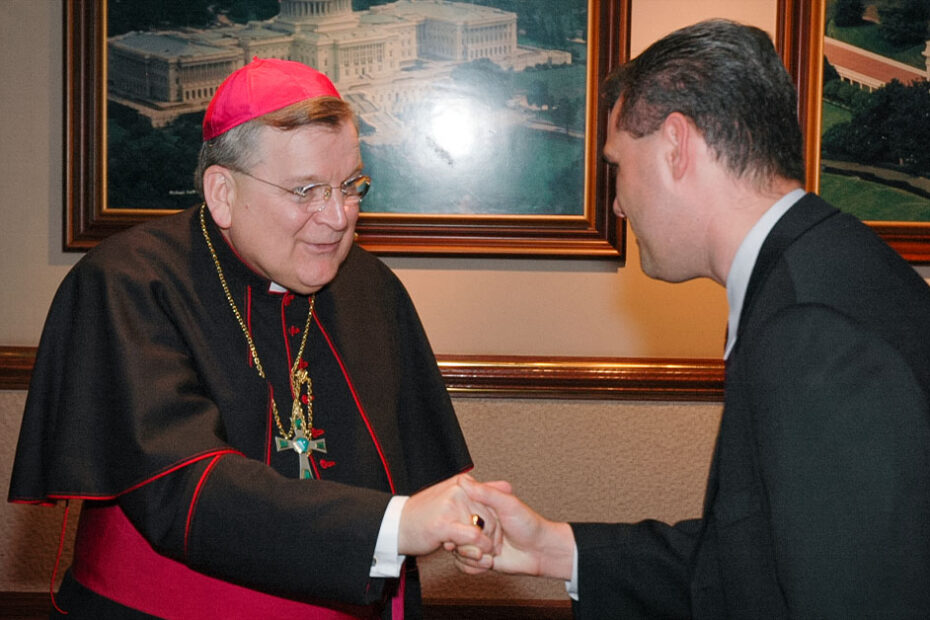By Judie Brown
News outlets have reported that Pope Francis is “withdrawing Cardinal Raymond Burke’s Rome residence and salary because he sees him as working against the unity of the Church.” Some media have referred to this as a type of punishment, suggesting without confirmation that the pope has an axe to grind with faithful prelates like Bishop Joseph Strickland and Cardinal Burke.
We have seen comments in the media that Pope Francis described Cardinal Burke as his enemy, though the pope has denied this. But we think there is something else afoot here, and it needs to be addressed frankly and with clarity.
Cardinal Raymond Burke was the first prelate to join us in our campaign to defend Christ from sacrilege by speaking out about Canon 915 and what it means in terms of Catholics in public life who advocate for abortion yet who continue to receive the body of Christ in the Eucharist. In case you are not aware, this canonical law of the Church states that “those who have been excommunicated or interdicted after the imposition or declaration of the penalty and others obstinately persevering in manifest grave sin are not to be admitted to holy Communion.”
In simple terms, this Church law protects the body of Christ, yet there are many in politics, public life, and within the Church who do not agree that the Eucharist should be defended from sacrilege. That is a fact and could well be part of the reason for the pope’s recent action, though we cannot say that with certainty.
In a 2021 document entitled “Statement on the Reception of Holy Communion by Those Who Persist in Public Grave Sin,” Cardinal Raymond Burke wrote: “Clearly, no priest or bishop can grant permission to a person who is in public and obstinate grave sin to receive Holy Communion. Neither is it a question of a discussion between the priest or bishop and the one who is committing the sin, but a matter of admonition regarding truths of faith and morals, on the part of the priest or bishop, and a matter of reform of an erroneous conscience, on the part of the sinner.”
While this makes total sense, the Church law itself has been a matter of disagreement.
Yet Burke and Strickland, among others, have never backed away from defending Christ and His bride, the Church. Bishop Strickland issued a statement containing these words:
Receiving Communion at Holy Mass is one of the most profound ways we can say, “Lord, I love you.” To simultaneously ignore His commandments, whether it be “thou shall not have false gods before me, thou shall not kill, thou shall not steal” or any of His other commandments, is to place ourselves on a contradictory path of grave sin. The wonder of God’s loving call in each of our lives is that He leaves us free to choose to receive Him in the Eucharist, but it is incumbent on each of us to choose honestly, faithfully, prudently and with spiritual and moral consistency to do so.
In fact, there are more than a dozen bishops who stand with Burke and Strickland on this matter, so why is it that Pope Francis would appear to be punishing such valiant shepherds? Only the pope himself can answer this, of course, but it does give us cause to ponder reports suggesting that the pope may not be in total accord with such actions. During his travels, Pope Francis once said, “And what should the pastor do? He shouldn’t go around condemning.” He said that he had not personally denied the Eucharist to a pro-abortion politician. And since we know that he did give the body of Christ to pro-abortion Joe Biden, we see that he is a man of his word.
These are trying times. Political correctness has affected so many aspects of human behavior. It is as though simple truth is easily swept away in deference to human feelings or opinions.
We have fervent hope that, in the months to come, clarity will exhibit itself because right now we are unable to understand the obvious injustices perpetrated against such holy men. Being Catholic without apology, as in the case of Bishop Strickland and Cardinal Burke, should be respected and praised, not banished.
